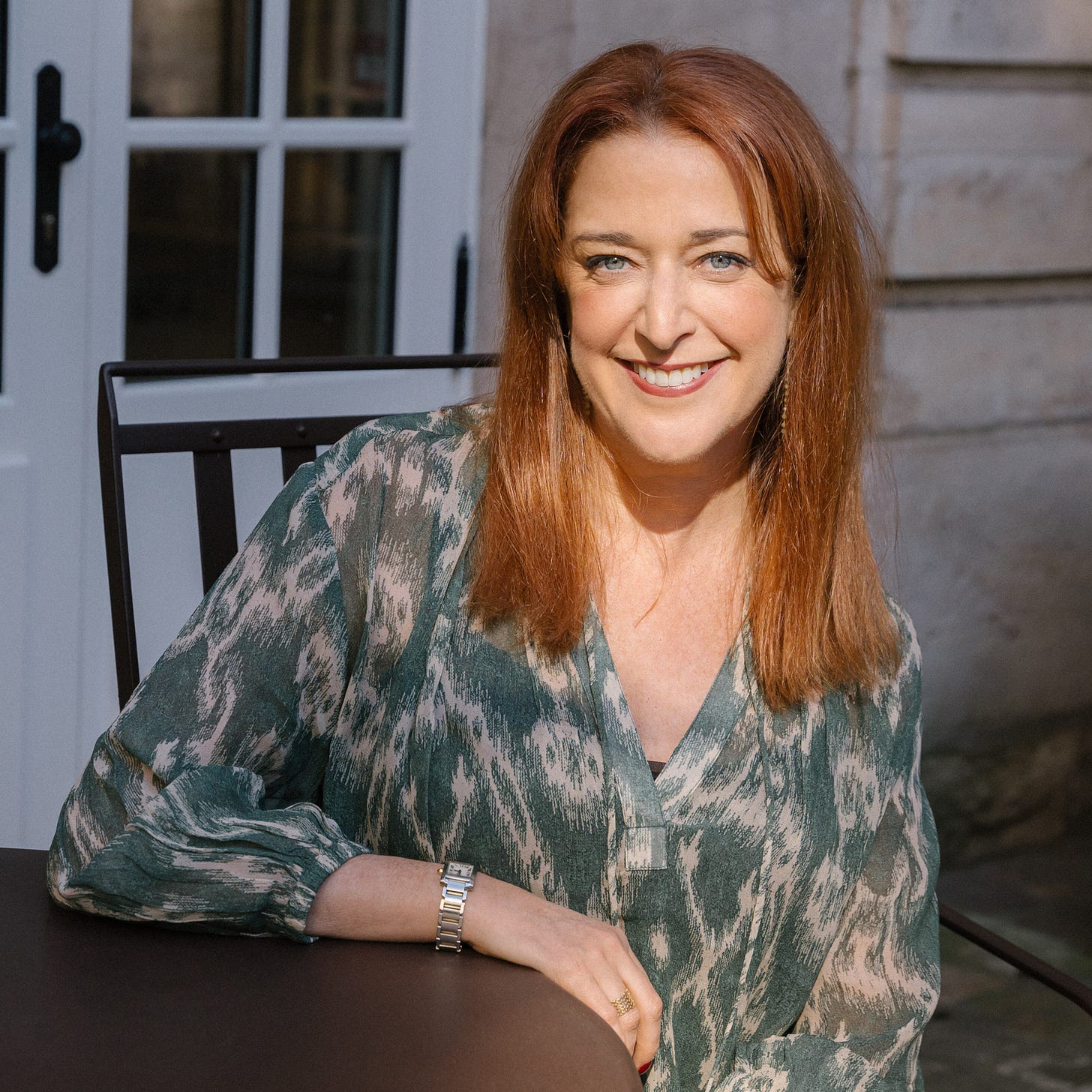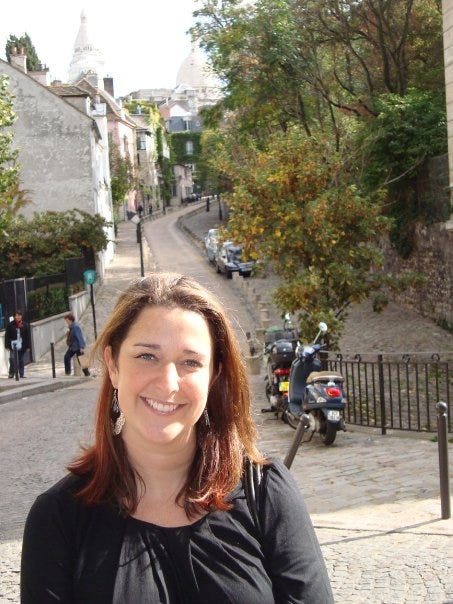Leaving America Questionnaire #16
Whitney Cubbison, writer & communications consultant, 15th arrondissement
What drives Americans to leave home and settle elsewhere? That question has been on my mind for many years. This series, Leaving America, seeks to uncover the multitude of reasons and lessons learned—beginning with Americans in and around Paris. Become a paid subscriber to access this newsletter’s archives.
One path to living abroad is through work and the attendant ‘expat package’ that often makes the transition to a new city and country smoother. But what happens when you want to stay after the contract ends? Whitney Cubbison was sent to Paris while working for Microsoft. But when her relationship dissolved and, later, so did the job, she needed to rethink her future in the city she had come to love. Below, Whitney talks about the benefits of a corporate move, the challenge of rebuilding, and what you should know if you’re eager to do the same.
Where was the last place you lived in the U.S.?
Seattle, Washington. I left for Paris in late 2009.
Did you intend to leave permanently or was the move temporary?
Officially, I came over on a two-year expat assignment with Microsoft to serve as the speechwriter for the company’s head of international sales. In my heart of hearts, however, I was hoping to stay longer. This year will mark 16 years since my arrival, so it looks like my heart won!
Was there a pivotal moment when you knew your life would be best pursued elsewhere?
I was a French major at UCLA and spent my junior year studying in Lyon, France. While there, I decided that one day I’d live and work in Paris, at least for a few years. It was always the dream, and Microsoft was the answer to making that dream come true. Since moving here, people have often asked me, “do you think you’ll stay in France forever?” I always reply, “Forever is a really long time.” For a while, I believed that if I did leave Paris, it would be for a big job or a big love, but if I found either or both here, I’d stay.
However, since leaving Microsoft, gaining French citizenship, and becoming a full-time writer (all of which happened in 2022), it’s become clear to me that there’s nowhere better for me to be than Paris. My tax status with the government is as an “auteur/artiste”—an author/artist. With this declaration, I have one very practical thing: health insurance. If I moved back to the States today, it would be insanely expensive to have that coverage, so oddly, I was thirteen years into my stay in Paris when I decided life was definitely NOT best pursued elsewhere.
What sort of financial consideration did the move require, even if as a student initially? Does one need a plump savings account to make this work?
Coming over with Microsoft made the move exceedingly easy on the financial front. In the years since, I think expat packages have gotten less cushy, but in 2009, they took care of absolutely everything. I was extremely lucky.
At what age did you leave? Looking back, was that too soon or too late?
I was 33 when I left Seattle. Coming to Paris was always the plan, but I wanted to make it happen in the context of my career path. I didn’t want to take a step backward or sideways in my career just to move, which, in retrospect, was rather idealistic. In the end, it all worked out the way it was meant to. And it was definitely worth the wait.
When did you know you'd made the right [or wrong] call?
I moved to Paris as a married woman and got divorced right around the time my initial two-year expat contract was expiring. Because living here had been my dream and those first two years were so tough as my personal life fell apart, I was bound and determined to stay here and “do Paris on my terms.” I think it was then that I knew this place was going to hold onto me and I to it, although I might not have guessed for how long.
“Doing Paris on my terms” ultimately led to me writing my first novel, a fictionalized version of my own dating misadventures as an expat divorcee in Paris—a rom-com called Will There Be Wine? I published it about seven months after leaving Microsoft, and I had so much fun doing it that I recently published a sequel called Will There Be Love? It was in writing this second book that I decided that working as a writer was what I really wanted to do. It’s a realization I think I may never have come to in the States, for a bunch of reasons. In a real way, living in Paris gave me permission to make that change, so yes… coming here was the right call.
What does Paris offer you that your native home couldn’t and, perhaps, still can’t?
In addition to the aforementioned health insurance as an independent writer, the thing that I love about living here that I didn’t have in the US is having true diversity in my life. I began my career in San Francisco, where nearly everyone worked in tech. Then, I was in Seattle, where roughly 35,000 people worked for Microsoft. Because of that homogeneity, the dinner party conversations were often fairly predictable.
In Paris, my circle of friends comes from all over the world and works in a broad range of industries–everything from defense to the arts, medicine, energy, fashion, food, diplomacy, travel, and more. Dinner party conversations are never dull.
I also think there’s something magical about living in such a diverse community, surrounded by people who have chosen to leave their home country to start over in a new place. Expats and immigrants have a unique combination of grit, optimism and openness that I find truly inspiring.
Can you share any anecdotes about your highest and lowest moments in Paris?
My lowest moment was right toward the end of Covid in October 2021. I’m a wild extrovert and single, so living alone and working from home for those two years was exceptionally brutal. Right when we were allowed to return to the office, I badly sprained my ankle, stranding me further at home, and just a few days after that, I lost my dad very suddenly. Unfortunately, the universe wasn’t done with me, and a few months after that, I lost my job. It was a particularly dark time. However, after taking some time to recover, I was able to re-emerge into a totally new life.
As for the highest moments, there are a few to choose from, but the most recent was last summer during the Olympics. Those few weeks were utterly bursting with joy, celebration, and camaraderie. Many Parisians fled the city, expecting it to be a nightmare, but I wouldn’t have missed it for the world. I attended ten events across both the Olympic and Paralympic Games, always cheering for both the US and French athletes and feeling invested in the success of both of my countries’ teams. I’ve never experienced such a prolonged period of unadulterated, shared joy as was pulsing through Paris in those weeks.
Are there aspects of American life that you long for?
When I go back to my home state of Texas, I always head straight for a Tex-Mex restaurant. That’s the food I miss the most. Give me all the queso, all the salsa, and a top-shelf margarita on the rocks, please!
What book or movie do you most associate with the American experience abroad?
Before Sunrise. I adored every second of Ethan Hawke and Julie Delpy’s long, random but thoughtful conversations while meandering through Vienna (and also through Paris in the sequel, Before Sunset). Constantly meeting new people and living with curiosity are core to my life abroad, and I think that movie nails the experience.
If you had to narrow it down to one, what is the greatest lesson living abroad has taught you about yourself and the world?
One of my first important lessons learned after moving abroad was that when you’re surrounded by nothing familiar, you have to learn to rely on your instincts. And when those prove correct, your confidence goes up and you quickly become more sure of your place in the world. This exact thought is conveyed in Will There Be Wine? as two of the female friends reflect on their own experiences in moving abroad. Safe to say that writing that book was one way I processed all of those complex emotions and lessons that come along with starting over in a new country."
“…when you’re surrounded by nothing familiar, you have to learn to rely on your instincts.”
— Whitney Cubbison
Have you ever considered going back? (Why or why not)
I’ve certainly considered it, especially when I’ve been away from nature for too long. I find myself fantasizing about being back in Seattle, living on the Puget Sound and being able to kayak or sit around a campfire with friends whenever I want. Paris is a concrete jungle, like any big city, but a quick trip to anywhere on the Mediterranean always reminds me that life on this side of the pond is hard to beat.
For those contemplating leaving the U.S., what do you suggest they consider most about the decision?
It’s possible but not easy to get by in France without speaking French, so before coming here, I’d recommend investing deeply in language classes. Once you’ve got the language thing down, it still requires a great deal of resilience to thrive in a foreign country, but if you’re eager to immerse yourself in the culture, find ways to integrate, and are ready to learn from (and be willing to laugh at) mistakes, it’s an incredible adventure.
Just be ready to get Frenched. It’s the term I use to explain the unexplainable, usually referring to French bureaucracy, but relevant to other things. “What happened?” someone will ask. “I don’t know. I got Frenched!” will be your best reply. Then you’ll laugh like an American, scowl like a Parisian, take a sip of wine, have a bite of cheese, and move forward. And it will be marvelous.
Click here to read all previous Leaving America questionnaires. If you think a friend would enjoy The New Paris Dispatch, gift subscriptions are available here.




Love this. One of my breaking points back in the U.S. was I couldn't figure out how to make health insurance work as a self-employed person without a partner. It's funny how American artists have been coming to Paris for generations for inspiration, for creative community... but now also for health coverage.
Loved this interview. Whitney’s experience echoes so many of our own challenges and joys settling into becoming French. I’m from Seattle too, and if Whitney wants a Puget Sound kind of experience, I’d recommend southern Norway. I was just there, and it really reminded me of the Pacific Northwest. When you live in France, you’ve got all of Europe at your doorstep.